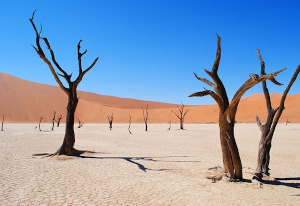Heat wave, a dreaded phenomenon
Rising temperatures directly result in drought and forest fires, while heavy precipitation causes devastating floods and landslides, two events representing the same risk: global warming.
Heat wave: record high temperatures in 2022
 The four corners of the planet, mainly the northern hemisphere, are suffocating every summer under the effect of scorching temperatures. This phenomenon feeds an exceptional drought that alters the soil and dries up the rivers, a dry climate that favors the formation of devastating fires that destroy fauna and flora.
The four corners of the planet, mainly the northern hemisphere, are suffocating every summer under the effect of scorching temperatures. This phenomenon feeds an exceptional drought that alters the soil and dries up the rivers, a dry climate that favors the formation of devastating fires that destroy fauna and flora.
The sixth report of the IPCC (Intergovernmental Panel on Climate Change), published in 2022, estimates that the current warming of 1°C is already causing a 70% increase in the frequency of drought episodes worldwide. A warming of 2°C would increase this frequency by 140%.
Heat wave and drought: the most affected regions in 2022
According to the European Drought Observatory (EDO), this summer Europe has faced the most severe drought in at least 500 years. Two thirds of the continent have been placed on alert. In addition, river navigation, hydroelectricity production, vegetation and the yields of certain crops have been heavily impacted by the lack of rainfall. At the European Union level, the current harvest forecasts for corn, soybeans and sunflowers are respectively 16%, 15% and 12% lower than the average for the last five years.
Italy has experienced its worst drought this summer. The level of the Po River, which irrigates the north of the country, has dropped considerably, causing a 30% decrease in agricultural production. Due to the lack of water, the country was also forced to shut down its hydroelectric power plants.
In Germany, the receding of the Rhine, one of the main routes for transporting raw materials and goods, has affected economic activity. One month of low water means a 1% drop in industrial production.
In the United Kingdom, some regions reported record high temperatures. For the first time, the 40°C mark was crossed with a maximum of 40.3°C in Coningsby, an English village in Lincolnshire. In 2022, half of the British population was affected by water restrictions.
New temperature records were also broken in Asia, with Tokyo sustaining an extreme heat wave this summer, with nine days above 35°C.
A severe drought also affected southwest China after the hottest heat wave on record since weather measurements began in 1961. This caused the Yangtze River, which flows for about 6 300 kilometers across China, to dry up. The drought has also led to a drop in hydroelectric power generation, the shutdown of several industrial sites, the closure of factories for several days, restrictions on drinking water consumption and the risk of a sharp drop in agricultural production.
Morocco, whose water resources are constantly decreasing, is in a situation of structural water stress. According to the World Bank, this situation could reduce the country's economic growth to 1.3% in 2022 from almost 8% in 2021.
